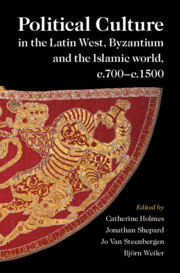‘Three medieval civilizations, at least partially derived from the Roman world and based on monotheism, confronted each other in the Mediterranean area. The authors, highlighting similarities as well as differences, have brilliantly explored the evolution of their political cultures (rulers, military class, role of families and women, resource allocation …).’
Jean-Claude Cheynet - Université Paris-Sorbonne (Paris IV)
‘A marvellous work of collaborative scholarship. Ideas take centre stage in this study of political dynamics in the West, Byzantium and Islam. It is comparative history at its best, seeking out the general from the particular and forming a very useful introduction to the medieval history of western Eurasia.’
James Howard-Johnston - University of Oxford
‘This is an illuminating and thought-provoking exploration of elite political culture--the theory and practice of power - across three cultural spheres that dominated medieval Eurasia. Carefully plotted and thoughtfully framed, the editors are to be congratulated for producing a sequence of interfoliated essays about medieval Eurasia that is sober and judicious.’
Paul M. Cobb - University of Pennsylvania
‘… a comprehensive and well-structured insight into the development of power and elite structures between the 8th and 15th centuries in the Latin-Western, Byzantine and Islamic world. … one can congratulate the editors of the volume on a successful basic work that achieves its goal.’
Miriam Salzmann
Source: H/Soz/Kult (hsozkult.de)
‘This volume represents an impressive achievement and substantial resource that will appeal not only to historians, but also to scholars of art, religion, and literature. … It brilliantly shows the value of long-term working groups and how efforts to make one’s field legible to newcomers can prompt a productive discussion of the terms and assumptions that shape our fields.’
Heather A. Badamo
Source: Speculum: A Journal of Medieval Studies



